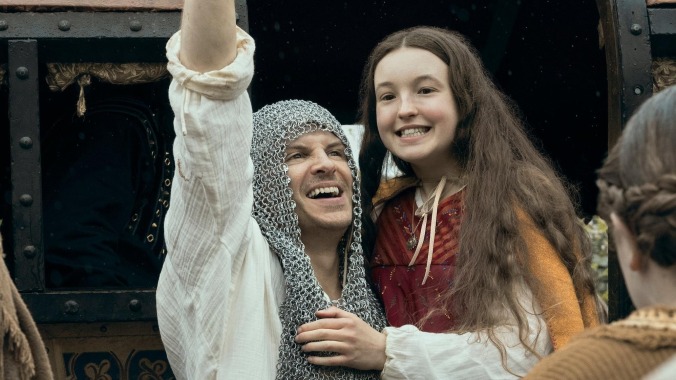Andrew Scott and Bella Ramsey star in Lena Dunham’s Catherine Called Birdy Photo: Prime Video
For those of you who have given up on Lena Dunham, no one can say you don’t have your reasons. Whether it’s because her groundbreaking HBO series, Girls, ended in 2017, or she’s been suffering through a bout of creative stagnation, Dunham’s spot in the cultural conversation has taken a major hit. The July 2022 theatrical release of Sharp Stick, her first feature directing effort since 2010’s Tiny Furniture, only compounded the worries. But Dunham has taken her oft-articulated concerns about women’s empowerment and self-determination and transported them to 13th-century England in Catherine Called Birdy, a charming, clever, and altogether delicious comeback film that redefines Dunham in a way that just recently seemed unlikely.
Dunham says she fell in love with Karen Cushman’s 1994 novel, Catherine, Called Birdy, when she was 10 years old, and her enthusiasm is immediately evident and infectious. The 14-year-old Birdy is played by the fabulous Bella Ramsey (Game of Thrones) with a mischievous smile that hides a wellspring of devious thoughts and insidious plans. She’s a whip-smart rebel, but she’s not always as smart as she thinks she is. When we meet Birdy, caked in mud after a spirited (most of her activities can be defined as spirited) garden romp with her friends, she conveys her utmost revulsion at how babies are made, which, she’s told, involves taking a “heated iron poker and sticking it up my nose.”
Her humor and attitude, both irreverent and more than a touch modern, gets her into—and out of—a lot of trouble. The latter will become most crucial after Birdy gets her first period (“I am dying. It is plain to see”), which prompts her father, Lord Rollo (a hilariously dippy Andrew Scott), to try and marry her off to rid himself of his debts. Much like the women from Girls were beholden to the mores and assumptions of 21st-century society, Birdy is trapped by a patriarchal system that thinks nothing of selling off young ladies for a velvet sack filled with coins.
To Rollo’s constant annoyance, Birdy goes to great pains to scare off every one of her potential suitors, until she meets the “cave-dwelling troll” she christens Shaggy Beard (a terrific Paul Kaye, masticating every line). Shaggy Beard loves a chase, so he’s not scared away when Birdy punches him in the nose or prepares an ointment made of feces for his aching joints. Their one-sided courtship leads to an ending that deviates significantly from Cushman’s novel and while the film’s wrap-up is a bit drawn out, it allows the self-liberated Birdy the option of choosing her own future.
In adapting Cushman’s work to the screen, Dunham crafts an endlessly quotable script that has no qualms about gleefully avoiding strict period accuracy. Birdy narrates the tale as a diary entry and while such near-constant voice-over would normally be an intrusive and annoying crutch, any opportunity for Birdy to articulate her thoughts about her friends, family, and would-be husbands proves welcome. She has particularly choice words for her hated father who can’t believe anyone would want to marry his “disgusting” daughter. Birdy is more inclined towards her Uncle George (Joe Alwyn), whom she idolizes, even if he refuses to romanticize his time serving in the Crusades and is often correcting the record on his supposedly good and heroic deeds. Birdy’s mother, Lady Aislinn (Billie Piper), is a reliable source of comfort, although one brutally difficult pregnancy serves as a reminder of the future responsibilities Birdy would prefer to avoid.
Many of the film’s rich, well-drawn characters represent the period’s often opportunistic attitudes towards love and marriage. Birdy’s friend Aelis (Isis Hainsworth) weds a 9-year-old who happens to be a duke, while George’s marriage to Ethelfritha (a luminous Sophie Okonedo) is strictly transactional: she gets the title she desires while he gets her money. Then there’s Birdy’s best friend, Perkin (Michael Woolfitt), fated to a life of struggle for reasons that add a note of progressivism that aligns with Dunham’s tendency to reach for “voice of a generation” significance. But it works, especially for a YA film, with only the emo-updates of songs like Alicia Keys’ “Girl On Fire” and Mazzy Star’s “Fade Into You” pushing the contemporizing too far.
Otherwise, Catherine Called Birdy wears its feminist and diversity bona fides lightly and with such skill that it masks, without ignoring, the dire predicament Birdy is actually in. Much of what transpires is a product of its time but by channeling her points through such a strong-willed and amusingly acerbic young heroine, Dunham establishes a sturdy connection to today. In Cushman’s novel, Birdy’s mother says her daughter should stop “pounding against the bars of your cage and be content.” In Dunham’s wonderful new film, a plucky young girl reminds us that pounding against the bars of your cage is how little birdies become free.

 Keep scrolling for more great stories.
Keep scrolling for more great stories.
